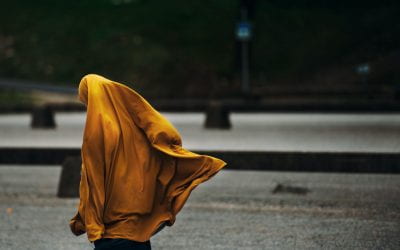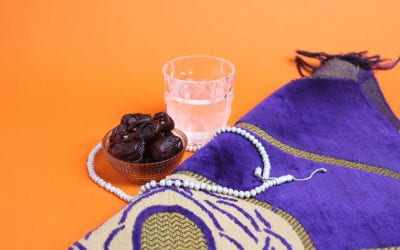Written by Salih Yucel
Latest Articles:
Lockdown: Mercy or Punishment?
As many of us begin to exit lockdown, undoubtedly one of the most different experiences of our recent times, it feels appropriate to reflect on the last two years from the lens of the Quran and Hadith (Prophetic traditions). Have the lockdowns been a punishment from God, or have they been a source of mercy?
Although lockdown seems to be a new concept for us, the stories in the Quran and Hadith show us that it is certainly not unique to our circumstances. Many Prophets and pious figures were made to experience a type of lockdown, to gain closeness to God, and grow spiritually, emotionally, and physically.

Jonah and the Whale
In the Quran, God narrates the story of the famous lockdown of Prophet Yūnus (Jonah) and his confinement to the belly of a fish. Described as being in “the depth of darkness,” Prophet Yunus is taken away from all worldly matters, and in his moment of despair, supplicates to his Lord with words of wisdom, humiliation, and repentance:
“There is no God except you, glorified are You, I was certainly from the oppressors.” (Quran, 21:87)
Hearing his sincere repentance and supplication, God saves Prophet Yunus and promises that He will save the believers in the same manner:
“So, We responded to him and rescued him from the distress. And this is how We rescue the believers”. (Quran, 21:87)
For those of us in lockdown, or when faced with any difficulty, there is comfort in knowing that if we earnestly repent to God, He will save us from all types of disturbances and worries, just as He saved Prophet Yūnus (Jonah).
The 7-Year Test
Prophet Ayūb (Job) also famously faced a form of lockdown. Once a rich man with many children, Prophet Ayūb possessed good health and all sorts of comforts, which he enjoyed for seventy years. However, when poverty struck and he fell sick with an affliction that affected his entire body, Prophet Ayub was abandoned by friends and family and placed next to a garbage dump outside the city [1, 2]. His condition continued for more than seven years, during which he exercised patience, remained thankful, and humbled himself before God. When his wife finally requested him to supplicate due to his unbearable condition, he replied that having enjoyed the best of health surrounded by luxuries for seventy years, it would be unworthy of him to complain of just seven years spent in pain and poverty.
However, when he felt his wife being trialled by Satan’s evil whispers [2], he supplicated to God with words that reflected his endurance, tolerance and humility:
“(My Lord) Here I am afflicted with pain, while you are the most merciful amongst the merciful.” (Quran, 21:83)
Prophet Ayūb’s (Job) story demonstrates the importance of remaining thankful to God in times of hardship and being grateful for the blessings and bounties bestowed on us.
The Imprisoned Prophet
Another prophetic lockdown taught to us was the one Prophet Yūsuf (Joseph) faced in prison. Despite his innocence, Prophet Yusuf (Joseph) prayed for his imprisonment to save himself from being lured into committing an immoral act:
“O my Lord prison is more beloved to me than what they call me towards.” (Quran, 12:33)
During this time, Prophet Yusuf (Job) showed concern for his fellow inmates and cared for them whenever needed. If anyone became sick, he would look after them, and anyone that he found sad or distressed, he would comfort with appropriate words and encourage them to observe patience. For entire nights, he would remain engaged in worship [3] and even invited the prisoners towards God:
“O my fellow prisoners, are different gods better or God, the One, the All-Dominant? Whatever you worship, other than Him, are nothing but names you have coined, you and your fathers. God has sent down no authority for them. Sovereignty belongs to none but God. He has ordained that you shall not worship anyone but Him. This is the only right path. But most of the people do not know.” (Quran, 21:39-40)
The activities Prophet Yunus was engaged in during his lockdown offer great lessons to us. By bringing comfort to others at the expense of his discomfort, he demonstrated the real meaning of worship. That is, it is not just a set of rituals to accomplish, but rather a way of life that pays enormous attention to how we deal, interact and serve each other.
The Cave of Hira
Even in his days before Prophethood, Prophet Muhammad would self-isolate away from the people of Mecca. Hidden in the cave of Hira with sufficient provisions to last days, the Prophet would engage in worship, contemplation, and deep meditation, reflecting on the creation and its existence. His wife, Āishah, states “Solitude was made beloved to the Prophet prior to revelation”. The late Islamic scholar Idrees Kandhlavi notes here a vital point:
“When God intends to shower His mercy upon a person, He cultivates the yearning for solitude and seclusion within the person’s heart”. [4]
It was also in the cave of Hirā’ where the Prophet received the first revelation. Here, he was given the responsibility of being the seal of the Prophets, the last Messenger for the rest of humanity.
Conclusion
The stories of Prophets Yunus, Ayub, Yusuf, and Muhammad are examples that even the most pious figures experienced a form of lockdown in their lives. However, the spiritual, physical and emotional growth that they achieved shows us that lockdowns are not automatically punishments. Instead, it is how we spend our time that decides whether it is a punishment or mercy. If our connection with our Lord is strengthened, and we have advanced closer to God, becoming more obedient towards Him, and living in line with the Sunnah, then lockdown is certainly mercy upon us. But, on the other hand, if it is a means of drifting away from God, or it imprints negligence and leads towards abandoning the Sunnah, then it is a punishment that calls for repentance.
The Scholars have mentioned that those who recite the supplication of Prophet Yūnus three hundred times daily will be amongst the ‘the constant seekers of repentance’. And, as the Prophet said, “Whoever constantly seeks repentance, God will appoint for him a way out of every distress and a relief from every anxiety. He will provide sustenance for him from where he expects not”. [5]
Additionally, the Prophet reminds us: “The supplication of Yunus (Jonah),…whilst in the belly of the fish: “There is no God except you, glorified are You, I was certainly from the oppressors”, certainly no Muslim has ever supplicated with it regarding anything, except that God has accepted it.”
When Prophet Muhammad was asked how to achieve salvation, he answered: “Control your tongue, confine yourself to your house, and weep over your sins.” [6]
Therefore, it is clear that it is in our hands to turn the lockdown period into a source of mercy for us. This is done by building a strong connection with God, increasing our knowledge, enhancing our level of engagement in worship, serving our families, becoming a source of comfort for the people around us, and exercising patience for the sake of God. Our Prophet’s words: “The world is a prison for the believers and a paradise for the disbelievers”, informs us that even after lockdown, this world still remains a type of lockdown for the believers, where they are required to observe patience by restricting themselves to the commands of God, enjoying the lawful beauties of this world, whilst realising that true freedom lies in the hereafter, as Prophet Muhammad has supplicated:
“There is no life worth living except the life of the Hereafter.” [7]
About the Author
Ahmad Moim Siddiqui is a hafiz who has immersed himself in Islamic studies from a young age. He has studied under Mufti Muhammad Taqi Usmani in Pakistan, attained his Shahadah Alamiya, completed his Bachelor of Islamic Studies from CSU, and the Iftaa from Jamia Ashrafiyah in Lahore, Pakistan. Ahmad has previously served as an Imam at a Canberra musallah and now teaches Secondary Islamic Studies and VCE Arabic at Al-Iman College in Melton, Victoria. He is currently completing his Masters in Secondary Teaching.





Maa Shaa Allah. Very inspirational indeed.
Maa’shaa’Allah great work brother.